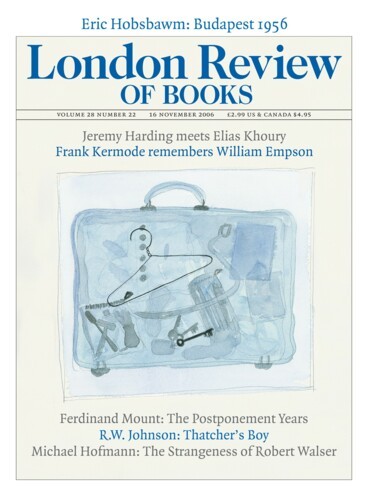‘Becoming a British citizen is a significant life event,’ the former home secretary David Blunkett writes. ‘The government intends to make gaining British citizenship meaningful and celebratory rather than simply a bureaucratic process.’ The quote is not from Blunkett’s diaries but from the funniest book currently available in the English language, published by the Home Office, and called Life in the United Kingdom: A Journey to Citizenship. The fact that the book is supposed to be very serious somehow makes it funnier, much as those 1970s public information films about keeping away from strangers and electricity pylons used to reduce children like me to tears of laughter when they were meant to fill us up to the brim with the fear of God.
Anyhow, just as it’s probably not a good idea to climb up electricity pylons, it probably is a good idea, if one is determined to become British, to know a thing or two about these islands and their lovable conventions. The notion is, of course, rather American, and, for years now, people who wish to become American citizens have had first to mug up on the fact that Mickey Mouse’s girlfriend is called Minnie and that George Washington used to gad about wearing wooden teeth. The British requirements for citizenship are no less strenuous. The point, the book tells us, is to help immigrants ‘to integrate’, and it might seem churlish of me to have requested from the Home Office a second book, one that might detail the history of ‘celebratory’ integration in the homeland of Enoch Powell and Stephen Lawrence.
The problem – or the hilarity – begins when one begins to read the code of honour that seems to be inscribed between the plain-speaking lines of the manual. One need hardly be I.A. Richards to spot the workings of this, but it often jars with the guide’s larger message of tolerance and live and let live. At times one could easily imagine the work had been authored by Bertie Wooster dressed as Johnny Citizen, but this might be inevitable when trying to sell the notion that a nation full of mongrels can be usefully thought of as a pack of thoroughbred bulldogs.
There’s a lot of ‘every schoolchild knows’ kind of talk, which is always rather dangerous, but there must be some benefit in new citizens understanding the importance of Magna Carta. I went to Southall the other day to visit the pound shops – ‘cheap department stores much favoured by old ladies and Scotsmen’, the guide might say – and as I walked the aisles I watched the women speaking Gujarati and wondered just how it might change them to know that England’s first literary masterpiece was The Canterbury Tales, ‘a secular tale of a nominally religious pilgrimage.’
Some people find this manual patronising, but they are often the kind of people who think it is patronising to tell children about the fundamentals of reading, writing and arithmetic. Yet one has to admit that the tone does occasionally become overweeningly well-meaning: ‘If we go back far enough in time, almost everyone living in Britain today may be seen to have their origins elsewhere … Britain is proud of its tradition of providing a safe haven for people fleeing persecution and conflict.’
Well, yes and no. But the fun really starts when you get to the descriptions of everyday domestic routines. Whoever wrote those bits can’t help offering a Dick, Dora, Nip & Fluff style rendition of family contentment, in which everybody hangs out of the windows of their square houses to smile their clean smiles and wave hello to the dustmen. ‘Waste must be put out for collection,’ it says. ‘In some parts of the country it is collected in plastic bags, in others it is in wheeled bins.’
The book is not shy of suggesting how to gain and maintain a happy life in Britain. It mainly involves playing your music ‘at a reasonable level’ and making an effort to ‘greet one another in a friendly way’. There is no advice about how to swear properly or how to open a can of lager without spraying your jersey, but the authors must have assumed people would find that out for themselves. On the other hand, there is a wealth of advice about how to conduct yourself in pubs. First of all, ‘groups of friends normally buy “rounds” of drinks, where the person whose turn it is will buy drinks for all the members of the group.’ And you must be sure to know the drill if you accidentally spill your neighbour’s vodka and tonic. ‘It is good manners (and prudent) to offer to buy another,’ it says. The world’s best book, however, is silent – too silent to bear – on how a British person must handle him or herself if the offer is refused and the hand that feeds is instead gnawed down to the bone.
New citizens must know that life in Britain is primarily about their safety. ‘Police officers must obey the law and also follow their own code of discipline,’ we learn. ‘They must not misuse their authority, make a false statement, be rude or abusive, or commit racial discrimination. Police officers who are corrupt, or abuse their position, are severely punished.’ I called the Home Office again – ‘one must refrain from pestering people by telephone’, damn – to ask them if it might be safe to submit Life in the United Kingdom for the Costa First Novel Award. They haven’t called back, which I don’t think is very British at all, do you? (Or prudent.)
Send Letters To:
The Editor
London Review of Books,
28 Little Russell Street
London, WC1A 2HN
letters@lrb.co.uk
Please include name, address, and a telephone number.

